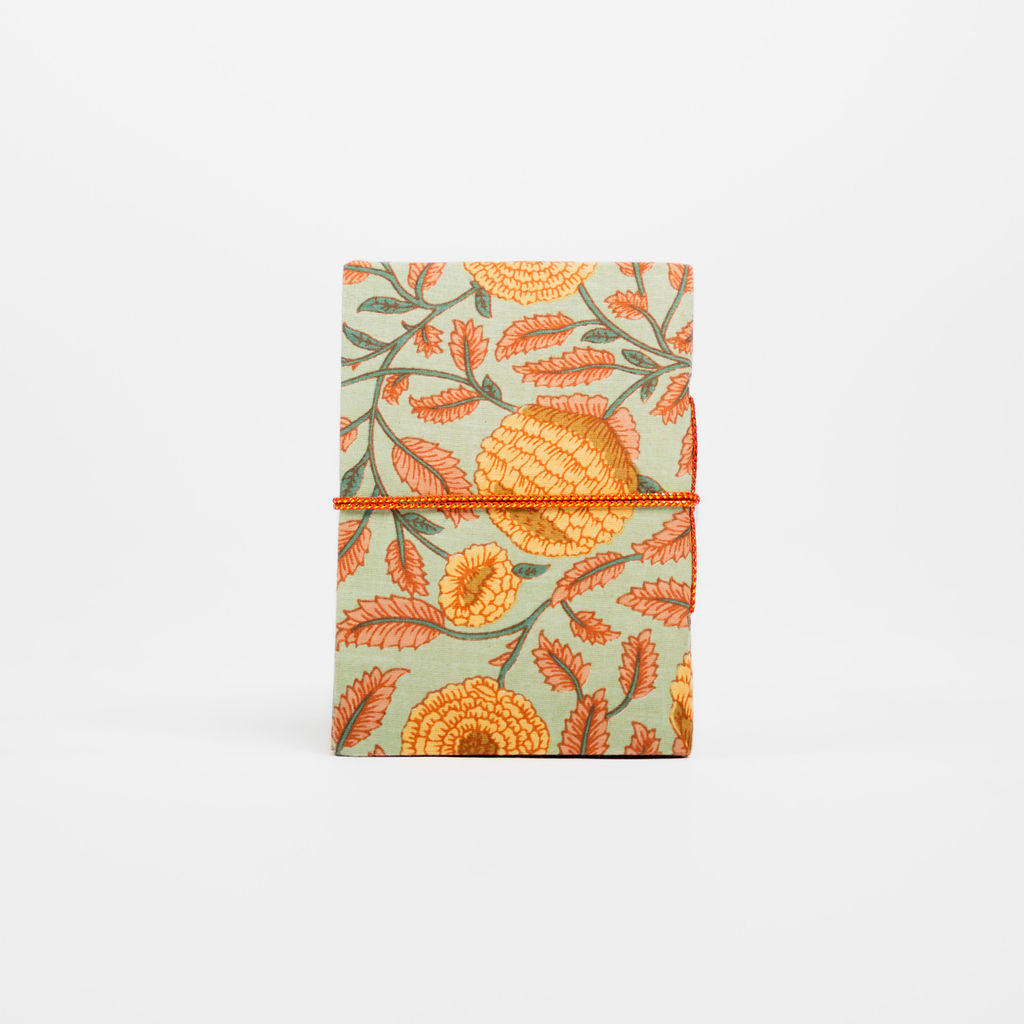
Sunflower Mint Block Print Notebook - Medium
This large notebook features block printing and is made from recycled cotton leftover from the Indian fashion industry. Each notebook comes with a slim sleeve, which is located in the center of the book and provides information about the sourcing and production process.
Height 16 cm Width 12cm
LEATHER BAGS
Leather bags are handwoven resulting in unique variations in colour and texture. These characteristics are not flaws but a testament to the handmade quality and natural materials used.
Refrain from carrying excessively heavy items to prevent deforming the bag’s shape.
If your bag gets wet, blot the water away immediately with a soft, dry cloth. Never immerse the leather in water or use artificial heat sources like radiators or hairdryers to dry it. Allow the bag to dry naturally.
Because we use natural dyes, there may be slight colour bleeding at first—especially with darker shades or in high humidity. While this doesn’t happen often, it is a natural possibility.
To help set the dye, we recommend leaving your bag in direct sunlight for several hours. The sun’s rays can assist in stabilising the pigments.
Since the dyes are natural, it may take a little time for any bleeding to fully subside. With regular use, your Ellyla Bag will develop a beautiful, unique patina that enhances its character and charm.
Always store your bag in a dust bag when not in use. This allows air circulation and prevents mildew. Ensure the dust bag is soft and does not scratch the leather.
NATURAL FIBRE BAGS
Dust Off Regularly: Use a soft, dry cloth or a soft-bristled brush to gently dust off your bag. This helps remove any surface dirt and prevents buildup.
Deep Cleaning: If your bag needs a deeper clean, mix a small amount of mild soap with lukewarm water. Use a soft cloth or sponge, dip it into the soapy water, and gently wipe down the bag. Avoid soaking the straw, as excessive moisture can weaken the fibers.
Drying: After cleaning, let your bag air dry in a well-ventilated area away from direct sunlight. Direct sunlight can cause the straw to become brittle and discoloured.
Avoid Overloading: Straw bags are sturdy, but they aren’t meant to carry heavy loads. Overloading can distort the shape and weaken the structure. Stick to carrying light to medium-weight items.
Handle with Care: When carrying your straw basket bag, use the handles or straps rather than grabbing the fibres itself. This prevents undue stress on the woven material.
Storage: When not in use, store your straw bag in a cool, dry place. Stuff it with tissue paper to help maintain its shape, and keep it in a dust bag or pillowcase to protect it from dust and sunlight.
Waterproofing: Straw is naturally absorbent, so it’s important to protect your bag from moisture. Consider using a fabric protector spray specifically designed for natural fibers. Test it on a small, inconspicuous area first to ensure it doesn’t discolour the fibre.
Quick Response to Spills: If your bag gets wet, blot the moisture immediately with a dry cloth. Do not rub, as this can spread the moisture and cause stains. Allow the bag to air dry thoroughly.
Stain Removal: For stubborn stains, use a slightly damp cloth with a touch of mild soap. Gently blot the stain, then wipe with a clean damp cloth to remove any soap residue. Let the bag air dry.
Fresh Air: If your bag starts to develop an odour, let it air out in a dry, well-ventilated area. Avoid leaving it in direct sunlight for extended periods.
Shape Retention: Always store your bag in a way that maintains its shape. Avoid crushing or folding it.
Repairing Minor Damage: If you notice small breaks or frays in the straw, you can carefully trim the loose ends with scissors. For more significant damage, consider taking it to a professional who specialises in repairing natural fibre materials.
Off-Season Storage: If you only use your straw basket bag seasonally, take extra care when storing it during the off-season. Clean it thoroughly, let it dry completely, and store it in a cool, dry place away from direct sunlight. Use a dust bag or a pillowcase for protection.
By following these tips, your straw basket bag can remain a charming and functional accessory for many years. Proper care not only preserves its beauty but also respects the craftsmanship that goes into creating these timeless pieces.

